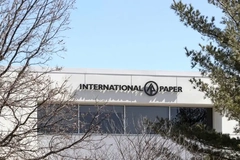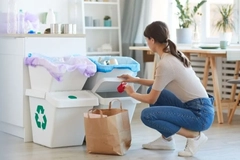Alcoa Participates in the World's First Carton Packaging Recycling Plant Using Innovative Plasma Technology; The Plasma Process Separates Aluminum and Plastic, Components of the Aseptic Package

Alcoa (NYSE:AA) announced today that its Brazilian affiliate, Alcoa Aluminio, has joined Tetra Pak, Klabin and TSL Ambiental to inaugurate the world's first carton packaging recycling facility located in Piracicaba, Brazil. The plant uses groundbreaking plasma technology, which enables the total separation of aluminum and plastic components from the cartons.
Alcoa (NYSE:AA) announced today that its Brazilian affiliate, Alcoa Aluminio, has joined Tetra Pak, Klabin and TSL Ambiental to inaugurate the world's first carton packaging recycling facility located in Piracicaba, Brazil. The plant uses groundbreaking plasma technology, which enables the total separation of aluminum and plastic components from the cartons. This innovative process constitutes a significant enhancement to the current recycling process for carton packaging, which up until now, separated paper, but kept plastic and aluminum together. The plasma process provides another option for recycling, allowing for the return of all three components of the package to the productive chain as raw material. Alcoa, which supplies thin-gauge aluminum foil to Tetra Pak for aseptic packaging, uses the recycled aluminum to manufacture new foils. The new plasma facility has the capacity to process 8 thousand tons per year of plastic and aluminum, corresponding to recycling approximately 32 thousand tons of aseptic packaging. The emission of pollutants during the recovery of the materials is minimal, handled in the absence of oxygen, without combustion, yielding an energy efficiency rate close to 90%.Alcoa (NYSE:AA) announced today that its Brazilian affiliate, Alcoa Aluminio, has joined Tetra Pak, Klabin and TSL Ambiental to inaugurate the world's first carton packaging recycling facility located in Piracicaba, Brazil. The plant uses groundbreaking plasma technology, which enables the total separation of aluminum and plastic components from the cartons. This innovative process constitutes a significant enhancement to the current recycling process for carton packaging, which up until now, separated paper, but kept plastic and aluminum together. The plasma process provides another option for recycling, allowing for the return of all three components of the package to the productive chain as raw material. Alcoa, which supplies thin-gauge aluminum foil to Tetra Pak for aseptic packaging, uses the recycled aluminum to manufacture new foils. The new plasma facility has the capacity to process 8 thousand tons per year of plastic and aluminum, corresponding to recycling approximately 32 thousand tons of aseptic packaging. The emission of pollutants during the recovery of the materials is minimal, handled in the absence of oxygen, without combustion, yielding an energy efficiency rate close to 90%.











